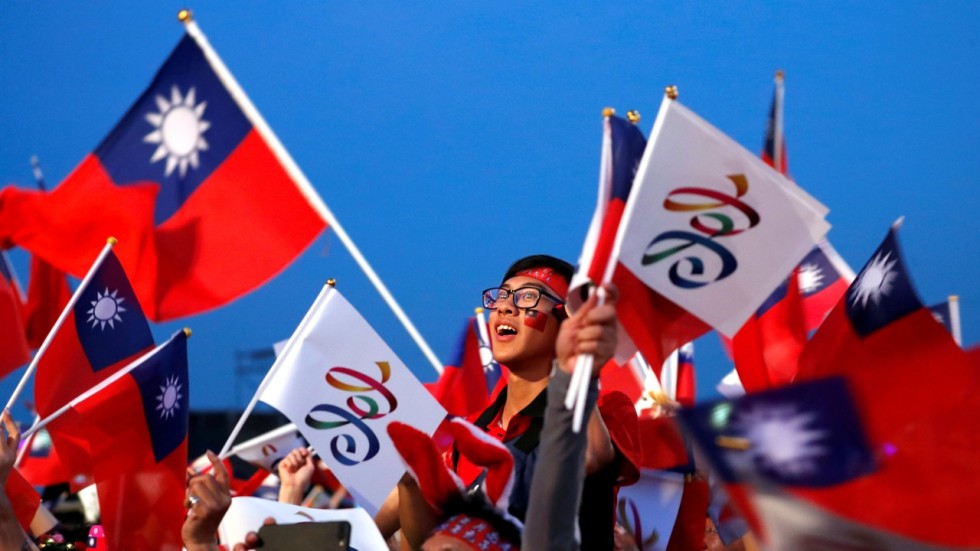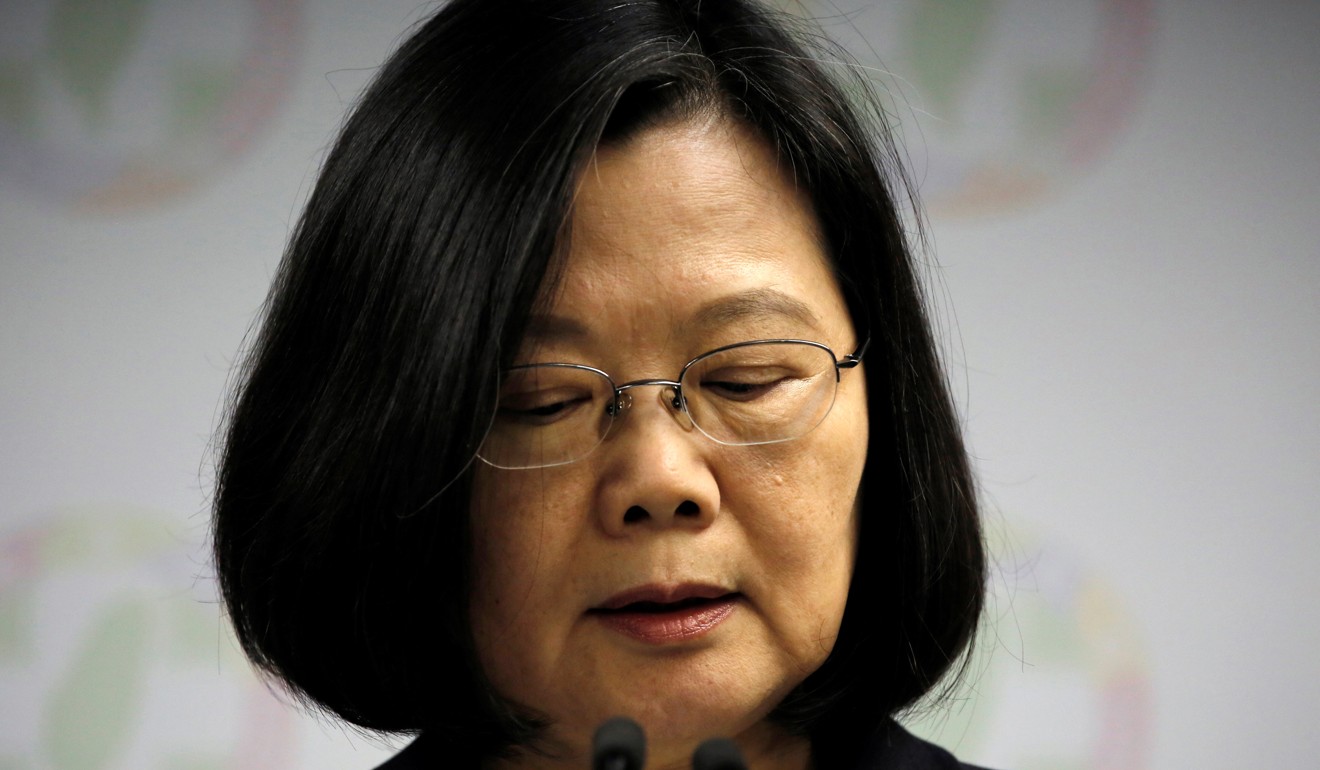Local elections saw independence-leaning Democratic Progressive Party lose control of several strongholds
US says polling highlights strength of self-ruled island’s democratic system

Minnie Chan
US says polling highlights strength of self-ruled island’s democratic system

Minnie Chan
taiwanese president resigns as party chairwoman after huge polls defeat25 Nov 2018
Beijing said on Sunday it would welcome more cooperation between Taiwan’s cities and prefectures and the mainland after the island’s independence-leaning ruling party suffered a local election reverse.
The losses suffered by the Democratic Progressive Party (DPP) may also take some heat off the already strained China-US relations, within which the self-governed island has been a sensitive issue for decades.
In Saturday’s poll, the DPP was defeated in seven of the 13 cities and counties it had previously controlled. The results prompted Tawian’s president Tsai Ing-wen to resign as the party’s chairwoman.
“The [poll] results reflected the strong wishes of Taiwan’s general public that they want to continue to share the benefits of peaceful developments in cross-Taiwan Strait relations, as well as improving the economy and living standards,” mainland China’s Taiwan Affairs Office spokesman Ma Xiaoguang said.
Taiwan’s image as Asia’s LGBT rights beacon takes a hit as same-sex marriage referendum fails
The mainland would continue to uphold the 1992 consensus between Beijing and Taipei that they belong to the same country, he was quoted by Xinhua as saying, adding that it would “resolutely oppose any separatist forces involved in ‘Taiwan independence’ and other related activities”.
“We invite more Taiwan counties and cities to join exchanges and cooperate with their mainland counterparts on the basis that there is a correct understanding of cross-strait relations,” Ma said.

However, Taiwan’s Mainland Affairs Council urged Beijing not to “intervene in Taiwan’s internal affairs” or have a “one-sided political interpretation of Taiwanese people’s expectations about the cross-strait relationship”, as it would not aid its future development.
The election saw the opposition Kuomintang (KMT), which is seen as more friendly towards Beijing, make significant gains, although much of the campaigning had focused on domestic issues such as living standards.
The US government on Saturday extended its congratulations to the successful candidates, saying the vote had “once again demonstrated the strength of their vibrant democratic system through a successful round of elections”.
“We look forward to working with our counterparts – new and old – to continue our fruitful cooperation on a wide range of issues of mutual concern,” a spokesman for the US State Department told the Central News Agency.
Taiwanese president resigns as party chairwoman after huge polls defeat
Taiwan’s democratic institutions continued to serve as a role model for the entire region, and the US looked forward to finding new ways to highlight Taiwan’s positive example, he said.
Beijing considers Taiwan a breakaway province that must eventually be reunified with the mainland, by force if necessary.
It suspended official exchanges with the island after Tsai was elected president in 2016 and refused to reaffirm the 1992 consensus and accept the one-China principle.
Meanwhile, amid the trade war, the administration of US President Donald Trump has been more assertive than its predecessors on promoting informal ties with Taipei, including deploying its warships in a high-profile sail through the sensitive Taiwan Strait last month.
Tsai’s government also said it aspired to have a role in the US Indo-Pacific Strategy, which is widely seen as Washington bid to compete with Beijing for geopolitical influence in the region.
With the election defeats and a referendum to change the island’s name in international sports event vetoed, some analysts expect Tsai’s government to soften its tone on the mainland, which could in turn lessen its significance on the China-US agenda.
“The mainland expects the DPP to rein in its pro-independence movement after its defeat in the local elections, and that will reduce the negative impact on the negotiations between Beijing and Washington,” said Jia Qingguo, head of international relations at Peking University.
“Beijing also understands that it’s impossible to speed up the reunification of Taiwan even with more pro-Beijing Kuomintang candidates in local government, as the two sides still have huge differences.”
European firms counting the cost of icy Beijing-Taipei relations
Arthur Ding, an associate research fellow at the Institute for Security and Development Policy in Stockholm, said the fact that the People’s Liberation Army had halted its island encirclement patrols in waters and airspace around Taiwan since June suggested Beijing did not want to further upset the Taiwanese people.
“It seems like Beijing wants to concentrate on the trade war with Washington, and is confident Tsai won’t make any provocative moves either,” he said.
Koh, Chin-yee, chief executive of the Longus Research Institute, a think tank in Singapore, said that whoever won the Taiwan elections, the US would still use it for leverage.
“The US will still play a key role in cross-strait relations, because even if the KMT wins the 2020 presidential election, Taiwan needs the US’ support in promoting the island to the international community,” he said.
Ma from the Taiwan Affairs Office said that the defeat of a referendum proposition that the island should seek to compete in the 2020 Olympics as Taiwan, rather than Chinese Taipei, showed that putting Taiwanese athletes’ interests at stake “was against the will of the people”.
Beijing was opposed to the proposal and the International Olympic Committee had warned Taiwan that its athletes risked being excluded from international competition.
www.fotavgeia.blogspot.com
Beijing said on Sunday it would welcome more cooperation between Taiwan’s cities and prefectures and the mainland after the island’s independence-leaning ruling party suffered a local election reverse.
The losses suffered by the Democratic Progressive Party (DPP) may also take some heat off the already strained China-US relations, within which the self-governed island has been a sensitive issue for decades.
In Saturday’s poll, the DPP was defeated in seven of the 13 cities and counties it had previously controlled. The results prompted Tawian’s president Tsai Ing-wen to resign as the party’s chairwoman.
“The [poll] results reflected the strong wishes of Taiwan’s general public that they want to continue to share the benefits of peaceful developments in cross-Taiwan Strait relations, as well as improving the economy and living standards,” mainland China’s Taiwan Affairs Office spokesman Ma Xiaoguang said.
Taiwan’s image as Asia’s LGBT rights beacon takes a hit as same-sex marriage referendum fails
The mainland would continue to uphold the 1992 consensus between Beijing and Taipei that they belong to the same country, he was quoted by Xinhua as saying, adding that it would “resolutely oppose any separatist forces involved in ‘Taiwan independence’ and other related activities”.
“We invite more Taiwan counties and cities to join exchanges and cooperate with their mainland counterparts on the basis that there is a correct understanding of cross-strait relations,” Ma said.

However, Taiwan’s Mainland Affairs Council urged Beijing not to “intervene in Taiwan’s internal affairs” or have a “one-sided political interpretation of Taiwanese people’s expectations about the cross-strait relationship”, as it would not aid its future development.
The election saw the opposition Kuomintang (KMT), which is seen as more friendly towards Beijing, make significant gains, although much of the campaigning had focused on domestic issues such as living standards.
The US government on Saturday extended its congratulations to the successful candidates, saying the vote had “once again demonstrated the strength of their vibrant democratic system through a successful round of elections”.
“We look forward to working with our counterparts – new and old – to continue our fruitful cooperation on a wide range of issues of mutual concern,” a spokesman for the US State Department told the Central News Agency.
Taiwanese president resigns as party chairwoman after huge polls defeat
Taiwan’s democratic institutions continued to serve as a role model for the entire region, and the US looked forward to finding new ways to highlight Taiwan’s positive example, he said.
Beijing considers Taiwan a breakaway province that must eventually be reunified with the mainland, by force if necessary.
It suspended official exchanges with the island after Tsai was elected president in 2016 and refused to reaffirm the 1992 consensus and accept the one-China principle.
Meanwhile, amid the trade war, the administration of US President Donald Trump has been more assertive than its predecessors on promoting informal ties with Taipei, including deploying its warships in a high-profile sail through the sensitive Taiwan Strait last month.
Tsai’s government also said it aspired to have a role in the US Indo-Pacific Strategy, which is widely seen as Washington bid to compete with Beijing for geopolitical influence in the region.
With the election defeats and a referendum to change the island’s name in international sports event vetoed, some analysts expect Tsai’s government to soften its tone on the mainland, which could in turn lessen its significance on the China-US agenda.
“The mainland expects the DPP to rein in its pro-independence movement after its defeat in the local elections, and that will reduce the negative impact on the negotiations between Beijing and Washington,” said Jia Qingguo, head of international relations at Peking University.
“Beijing also understands that it’s impossible to speed up the reunification of Taiwan even with more pro-Beijing Kuomintang candidates in local government, as the two sides still have huge differences.”
European firms counting the cost of icy Beijing-Taipei relations
Arthur Ding, an associate research fellow at the Institute for Security and Development Policy in Stockholm, said the fact that the People’s Liberation Army had halted its island encirclement patrols in waters and airspace around Taiwan since June suggested Beijing did not want to further upset the Taiwanese people.
“It seems like Beijing wants to concentrate on the trade war with Washington, and is confident Tsai won’t make any provocative moves either,” he said.
Koh, Chin-yee, chief executive of the Longus Research Institute, a think tank in Singapore, said that whoever won the Taiwan elections, the US would still use it for leverage.
“The US will still play a key role in cross-strait relations, because even if the KMT wins the 2020 presidential election, Taiwan needs the US’ support in promoting the island to the international community,” he said.
Ma from the Taiwan Affairs Office said that the defeat of a referendum proposition that the island should seek to compete in the 2020 Olympics as Taiwan, rather than Chinese Taipei, showed that putting Taiwanese athletes’ interests at stake “was against the will of the people”.
Beijing was opposed to the proposal and the International Olympic Committee had warned Taiwan that its athletes risked being excluded from international competition.
www.fotavgeia.blogspot.com

Δεν υπάρχουν σχόλια:
Δημοσίευση σχολίου